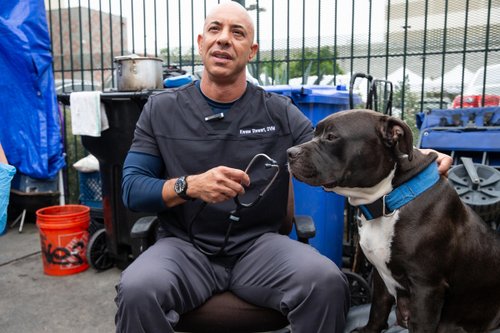Be real, get ahead: The power of authenticity in your career
25. 4. 2024
6 min.


Senior Editor at Welcome to the Jungle
Is it possible to be truly yourself at work? In a professional world often dominated by unwritten rules about how to dress, speak, and behave, many young professionals find themselves questioning whether they can show their true colors without risking their careers. Authenticity in the workplace is often touted as a key to deeper job satisfaction and improved performance. Yet, for many young professionals, being true to themselves feels at odds with the expectations and norms of corporate culture.
The quest to blend personal authenticity with professional expectations involves navigating complex social dynamics that can dictate the trajectory of one’s career. How do you maintain your individuality while meeting corporate standards? Can being yourself truly enhance your job performance and well-being, or does it come at a cost?
Pabel Martinez, the founder of Plurawl, turned these questions into a mission after his own experiences with the rigid dichotomies of corporate culture. His journey from concealing his identity to embracing it not only transformed his career but also inspired him to help others navigate these waters. Here, Martinez’s insights provide a powerful framework for understanding the benefits and challenges of workplace authenticity, especially for those just starting their careers.
“I was labeled aggressive, unapproachable, unfriendly, all these sorts of things. From now on, I’m gonna start being myself.”
Martinez’s path to authenticity
Martinez’s career initially followed a traditional script. Raised with the belief that certain appearances and behaviors were prerequisites for success, he recalls his grandfather’s words vividly: “Do you see presidents and CEOs with beards and tattoos and piercings? No. So act and dress accordingly.” This advice led Martinez to master the art of blending in, refining his image and even his personal anecdotes to mirror what he perceived as professional.
However, the turning point in Martinez’s career—and his view on authenticity—came during his time at Facebook. The company’s ethos of “Bring your most authentic self to work” seemed like an invitation to finally drop the façade. Yet, when he took the leap, the reaction was far from welcoming. He shares stories of how one PowerPoint presentation was criticized as “ghetto,” and his behavior was misconstrued as aggressive and unapproachable. This jarring mismatch between the company’s supposed values and the reality he faced led to a mental health crisis, forcing him to reassess his approach. “I was labeled aggressive, unapproachable, unfriendly, all these sorts of things,” Martinez recalls, marking a critical juncture. He decided to be unequivocally himself, telling his team, “How I dress isn’t me, how I talk isn’t me. From now on, I’m gonna start being myself.”
A career transformed
This bold declaration not only preserved his job but propelled his career to new heights. “Specifically at Facebook—I never got a performance review after that wasn’t an ‘exceeding expectations’,” Martinez notes. Embracing his authenticity unleashed a performance and creativity surge, proving not just to himself but to his peers and superiors that being genuine was a valuable asset. This profound personal and professional transformation inspired him to launch Plurawl, a platform dedicated to helping others navigate their own journeys toward authenticity. Martinez’s story is a clear example of the power of authentic self-expression and its ripple effect on career success and personal fulfillment.
“Staying in a place where you cannot be your true self is not only detrimental to your mental health but also to your professional growth.”
Navigating challenges in the workplace
Navigating authenticity in the workplace can be a complex challenge, particularly in environments that are less supportive of individuality. Young professionals often encounter scenarios where their true selves seem at odds with company culture—whether it involves expressing unique cultural identities, unconventional life choices, or simply divergent ways of thinking and working. These tensions can manifest in various forms, from subtle biases and microaggressions to overt criticisms and barriers to advancement.
Martinez’s advice on unsupportive environments
Martinez is candid about the realities of unsupportive work environments. His straightforward advice for those who find themselves stifled is clear: “Leave.” He suggests that staying in a place where you cannot be your true self is not only detrimental to your mental health but also to your professional growth. However, recognizing that not everyone can immediately exit such situations, he defines a supportive environment as one where individual differences are not just tolerated but valued. This includes having allies in leadership, access to mentorship, and opportunities for growth that align with one’s authentic self.
Sustainable strategies for authenticity
For individuals who are not in a position to leave their jobs, Martinez suggests several more sustainable strategies:
- Start saving: Build a financial cushion—what Martinez refers to as “F you money”—which can provide the confidence needed to make bold choices about your career path.
- Gradual authenticity: Begin introducing elements of your authentic self in small, manageable ways. This could mean starting with changes to your appearance that feel significant but are minimally disruptive, or sharing aspects of your personal life and hobbies that you might normally keep private.
- Build your case: Collect evidence of your competence and achievements so that your professional value is undeniable, making it harder for others to criticize personal aspects unrelated to your work performance.
- Seek allies: Find and nurture relationships with colleagues and supervisors who show support for diversity and authenticity. These relationships can provide both emotional support and professional leverage when needed.
- Speak it out: Initiate conversations about diversity and inclusion in the workplace, potentially leading small-scale initiatives or discussions that can gradually shift the culture.
- Utilize resources: Tap into any available resources for support, such as employee resource groups, counseling services, or mentoring programs, which can provide guidance and reinforce your sense of belonging.
Adopting these strategies will allow professionals to navigate the challenges of being authentic at work while simulataneously laying the groundwork for a more supportive and inclusive workplace culture. These measures not only benefit the individual by reducing the stress of incongruence between their personal and professional selves but also contribute to broader organizational change.
Practical steps toward authenticity
Achieving authenticity in the workplace is a journey, often requiring a strategic and mindful approach. Martinez advocates for a gradual approach to unveiling one’s true self, recognizing that immediate, radical changes can lead to significant resistance or misunderstanding.
Gradual approach to authenticity
Martinez suggests starting with small, incremental changes that signal your authentic self. This might involve:
- Adjusting personal presentation: Begin by altering elements of your dress code or personal presentation that are important to you but may be considered non-traditional in your workplace.
- Sharing interests gradually: Start sharing more about your hobbies or interests during casual office interactions to subtly introduce your colleagues to your authentic self.
- Expressing opinions thoughtfully: When comfortable, begin to share your unique perspectives in meetings, especially those that might challenge the status quo but add value to the discussion.
A gradual unveiling allows both the individual and their colleagues to adjust to the changes without overwhelming them, thereby minimizing potential backlash.
Facing resistance
Resistance is a common challenge when asserting one’s authenticity. Martinez emphasizes the importance of preparedness in such situations:
- Expect and plan for pushback: Anticipate the types of resistance you might encounter and prepare reasoned responses.
- Educate and inform: Use resistance as an opportunity to educate your peers about diversity and the value of different perspectives.
- Stay composed: Maintain professionalism and composure during confrontations to ensure that the focus remains on the issue, not the emotion.
Martinez also highlights the importance of knowing when to escalate matters to HR or higher management, especially if resistance turns into harassment or discrimination.
Building emotional intelligence with the Plurawl app
Central to Martinez’s strategy for fostering authenticity is building emotional intelligence, a key component of which involves understanding and managing one’s own emotions in professional settings. The app being built at his company Plurawl will play a crucial role in this process by:
- Providing personalized coaching: The app will act like a therapist in your pocket, offering prompts and exercises designed to help users explore and understand their emotions and reactions.
- Enhancing self-awareness: Through interactive sessions, the app will help users identify their limiting beliefs and the origins of these thoughts, encouraging a deeper level of self-reflection.
- Developing coping strategies: It will offer tools to develop resilience and tactics for handling stressful or challenging workplace scenarios.
“If you’re faking it, you may think that the only negative impact is on you … [that] couldn’t be further from the truth.”
Broader implications of being authentic at work
The journey toward authenticity in the workplace extends far beyond individual experiences, influencing broader workplace culture and personal well-being. By embracing authenticity, organizations and individuals can catalyze profound changes that resonate throughout their professional and personal lives.
Authenticity has a transformative impact on workplace culture. It fosters an environment where:
- Innovation flourishes: Authentic environments encourage diverse thinking and openness, which are crucial for innovation and creative problem-solving.
- Engagement increases: Employees who feel they can be their true selves at work are more engaged and committed to their organization.
- Well-being improves: Reducing the need for pretense lowers stress and enhances overall mental health, contributing to higher job satisfaction and better performance.
On a personal level, embracing authenticity allows individuals to experience a greater sense of fulfillment and alignment between their values and their work, leading to enhanced life satisfaction both inside and outside the workplace.
Inspiring the next generation
Martinez passionately believes that by choosing authenticity, today’s professionals set a powerful example for the next generation. “We all have somebody that looks up to us,” he notes, emphasizing the role model impact that authenticity can have. “If you’re faking it, you may think that the only negative impact is on you … [that] couldn’t be further from the truth.” Whether as mentors, colleagues, or community members, authentic individuals demonstrate that success does not require conformity. This legacy of authenticity inspires while paving the way for more inclusive and diverse professional landscapes for future workers.
Lastly, Martinez underscores the critical importance of authenticity and representation in the workplace. “As much as we want diversity and inclusion and all this other stuff, we often want other people to do it for us. But we’ve got to be the first ones to step up and be like, ‘I’m going to be the representation that I wish I had when I was younger.’” His call to action is about both individual courage and collective responsibility—to build workplaces and societies that truly value and celebrate each person’s uniqueness.
Photo: Bess Adler for Welcome to the Jungle
Follow Welcome to the Jungle on Facebook, LinkedIn, and Instagram, and subscribe to our newsletter to get our latest articles every week!

Viac inšpirácie: Inšpiratívne príbehy

The professionalism paradox: Navigating bias and authenticity with Pabel Martinez
Pabel Martinez challenges the conventional norms of professionalism by unraveling the complexities of workplace discrimination.
11. 3. 2024

How play can make you happy, creative and productive at work
Work-life balance usually means separating work and play, but it might be a better marriage than you think...
07. 11. 2023

Project Street Vet: Caring for the unseen paws of Skid Row
Providing vet-to-pet care in some of California's largest homeless communities, Dr. Kwane Stewart shares the ups and downs of his remarkable work.
29. 8. 2023

Girls learn how to have fun – and funds – by investing
A Danish trio is fighting gender inequality... on the stock market. We had a chat with one of the co-authors of the book Girls Just wanna Have Funds
30. 1. 2023

A conversation with Ted Conover, master of immersive journalism
We spoke to America’s reigning master of immersion reporting about political polarization, social media and how to hack it as a writer today
26. 1. 2023
Novinky, ktoré to vyriešia
Chcete držať krok s najnovšími článkami? Dvakrát týždenne môžete do svojej poštovej schránky dostávať zaujímavé príbehy, ponuky na práce a ďalšie tipy.

Hľadáte svoju ďalšiu pracovnú príležitosť?
Viac ako 200 000 kandidátov našlo prácu s Welcome to the Jungle
Preskúmať pracovné miesta


